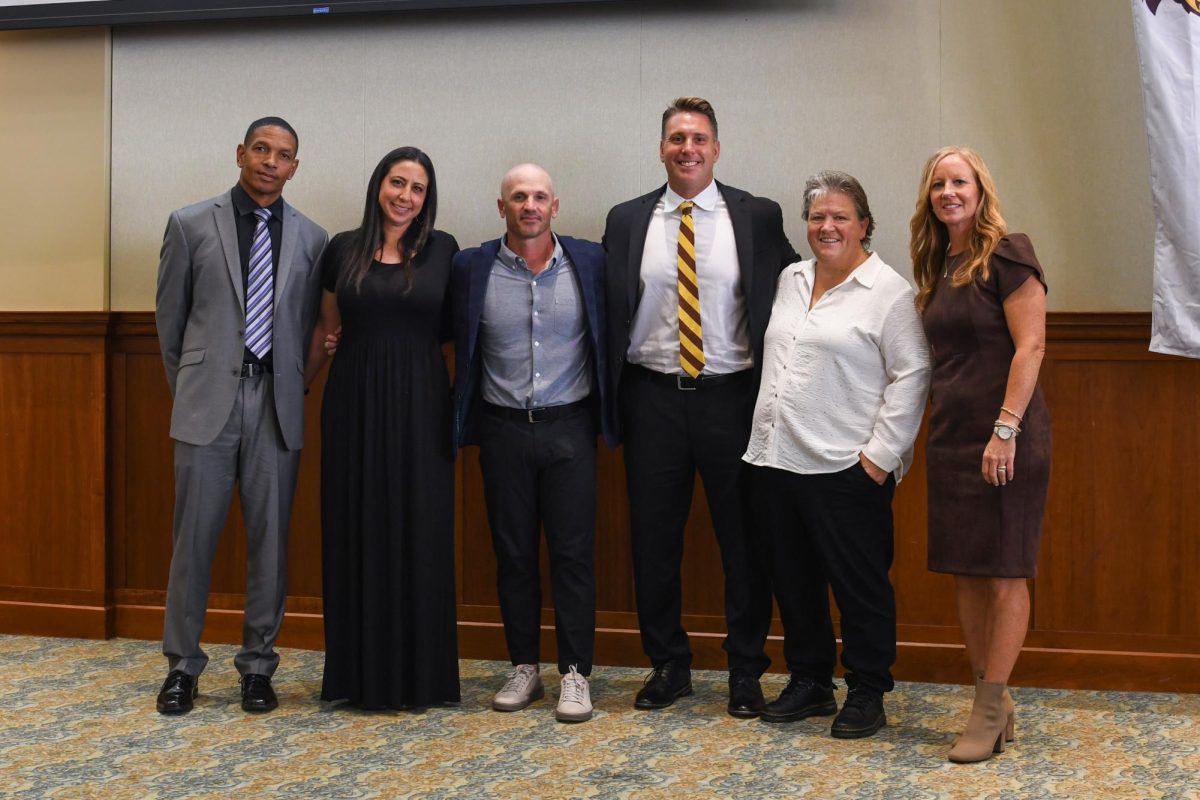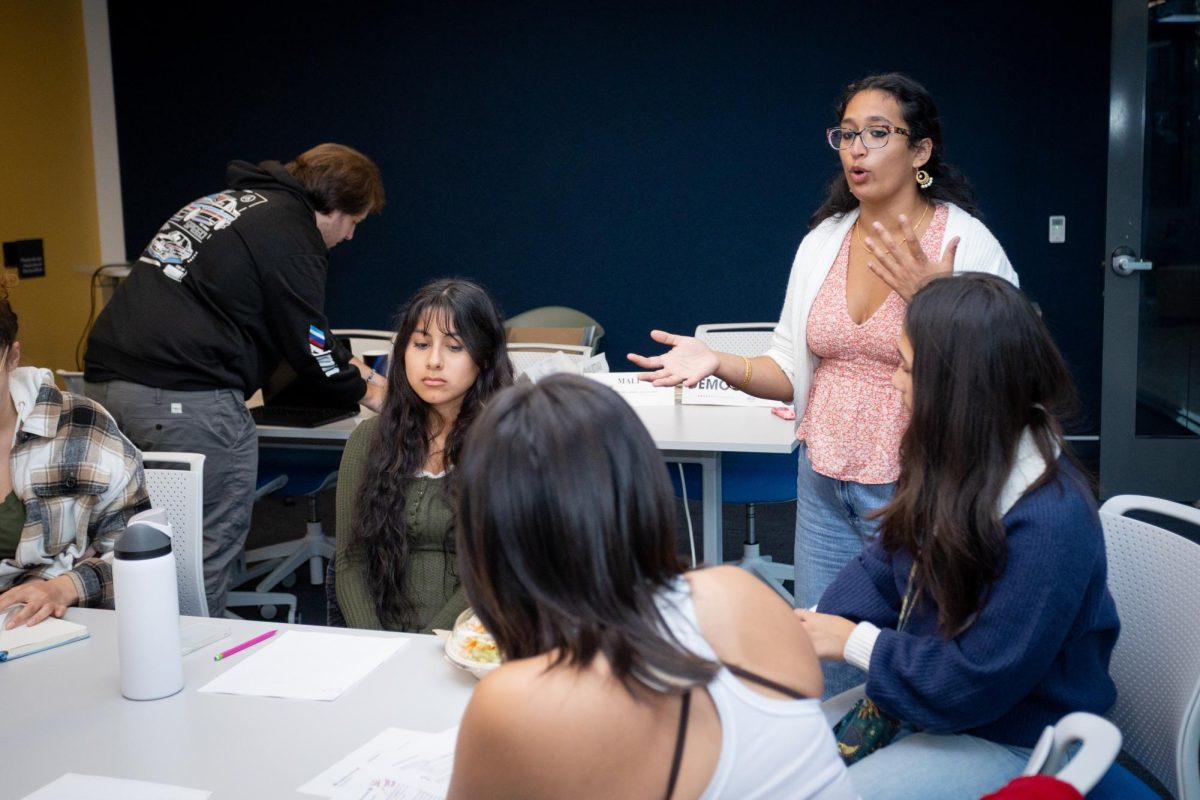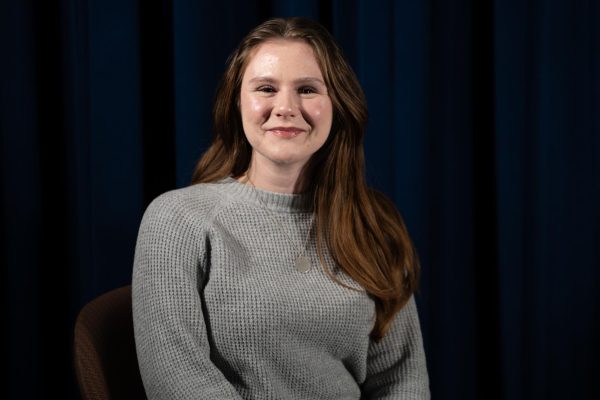Joe Nappi never wanted to be a teacher. He despised his time in school and could not imagine going back. Leaving high school, he planned on studying computer science as it seemed like a lucrative career option. After one class, he knew it was not for him and considered dropping out his freshman year of college. When his now-wife, Cristina, suggested he study history and become a teacher, he laughed at the ridiculousness of the statement. Today, he is nominated for the National Teacher of the Year award and was named New Jersey’s Teacher of the Year for 2023-2024. He has been teaching at Monmouth Regional High School for 16 years and is a proud Rowan graduate.
Nappi currently teaches history, focusing on the Holocaust and genocide psychology. In addition to his teacher of the year award and national nomination, Nappi is a Museum Teacher Fellow with the United States Holocaust Memorial Museum in Washington D.C., and is a member of Phi Alpha Theta, the New Jersey Council of Historical Educators, The Center For Human Rights Holocaust and Genocide Education (CHHANGE) at Brookdale College, and is Monmouth Regional’s district representative to the Kean University Diversity Council on Global Education and Citizenship. He has also been named district teacher of the year twice and is co-founder of the charity Monmouth Helping Its Own.
“What kind of put me on the path to education was September 11,” Nappi said. He was struck hard by the attacks and lost a family friend that day.
“It was really a horrible moment and experience to go through all of that and really made me kind of question what I was doing with my life. And like, what the purpose of this all was, just about chasing a paycheck and I really was looking for something more to do,” Nappi said.
This led to the conversation Nappi had with his wife that pushed him fully into becoming a teacher. When he returned to Ocean County College in the fall, he switched his major to liberal arts and started to seriously consider studying history.
“She told me, ‘If you were in charge, you can make it whatever you want,’” Nappi said. Cristina Nappi is an English teacher at Monmouth Regional and co-founder of Monmouth Helping Its Own. They also worked on the Student Council at Monmouth Regional together for about 10 years.
“Well, I always knew how intelligent he was… and I remember him talking about this history teacher that he had in high school and it was the only teacher I ever heard of that he liked. And I was like, ‘Well, what about history? Like, what about teaching?’” Cristina said.
As for his time at Rowan, Nappi said that he took it very seriously and “wasn’t much fun to be around.” Not only was he passionate about his studies but he was taking on every loan himself and could not afford to come out with poor grades. Nappi encourages college students to take it seriously but not let this time pass them by.
“I think it’s really important for you as college students to kind of embrace this moment in your life because there are so many opportunities that open up to you, that becomes so much harder later on to do… and I think the other part about that is kind of like being practical. I always encourage my students to like, pay attention to where jobs are, if you’re gonna go through this and do this it’s very important for you to find your passion and to have that sort of thing that drives you,” Nappi said.
When he began studying history, Nappi admitted that there was a lot of information he did not know going into the field and that his curiosity surrounding the reasons behind 9/11 opened up his world to diverse histories.
“That really kind of changed my viewpoint about how, you know, I guess that your access to information can change your perception of the world around you,” Nappi said.
He credits his time at Rowan for this as well. In taking courses about Islam and Muslim culture, he gained an appreciation and understanding that undid his “us versus them” mentality. Nappi also began to think about 9/11 as a hate crime on a massive scale which led to an interest in learning about genocide, which introduced him to the intricacies of Holocaust history and meeting Holocaust survivors.
“There’s just the sort of sad beauty in watching somebody share the most traumatic moment of their lives with strangers, just in the hope that this might not happen to them. You know what I mean? And I think that is something that always really resonated with me,” Nappi said.
In his classes, Nappi must hold the weight of heavy topics for himself and his students. At the beginning of the course, he tells them, “I don’t care why you took this class. I don’t care what brought you here. But just understand that you’re going to leave differently, there’s going to be a change that comes out of this.”
Although Nappi guides serious conversations in his classes, he notes the importance of keeping things light when appropriate and creating a safe, open space for students to be themselves. The way he puts it is that students will be able to joke and laugh in a class about the Holocaust but will never make jokes about the Holocaust and they can transition from having fun to covering serious topics. Nappi also employs social-emotional learning tactics in the classroom, which allow students space to reflect and connect.
This teaching style and connection with students has led Nappi to his National Teacher of the Year nomination in addition to the accolades he has already received. Part of his duties as NJ Teacher of the Year include leaving the classroom for six months and traveling the country to attend conferences and deliver speeches, which he began to do in January. While Nappi is honored to receive these titles, he says the most rewarding thing is hearing from students how he has shaped them.
“One part of this that I really wish I could share with other teachers is and I joke with my brother about this, that it’s kind of like attending your own funeral and that unfortunately, there’s something about the human condition where people don’t say what they feel about you unless they have a reason to, and this has given kids a reason to reach out to me. So I’m hearing from kids that I haven’t heard from for 15 years, just talking about what I meant to them or what I did or what I said,” Nappi said.
One of the biggest impacts Nappi has had on his community has been the creation of Monmouth Helping Its Own, a charity that helps the students of Monmouth. Growing up, Nappi was able to recognize that some kids came from different socioeconomic backgrounds than others and initially thought that the kids in suburban Monmouth may not have the same problems as the kids he grew up with in urban Bayville, NJ. During his second year of teaching, he learned the story of a student that changed his mindset and made him want to make a change. Monmouth Helping Its Own is made up of donations from teachers that can come directly out of their paychecks. Nappi said their average donation is around $5 and with around 140 staff members, this adds up. The money is then saved and used for when a student has an issue. In the 16 years since its creation, they have given out $75,000 in direct aid and scholarships.
“So when a student has an issue, you know, you run into a kid in class who can’t see the board and can’t afford glasses, who’s not wearing a winter coat, who’s got their hood on all the time because they’re ashamed because they can’t get a haircut, you know, whatever those scenarios are that we run into all the time. They can get sent to us and we hook them up with what they need to be successful in the classroom. We connect them with social services groups who do all those sorts of things,” Nappi said.
More than anything, Nappi credits his fellow teachers for collaboratively working on this and going into their own pockets to fund this project.
One of the most important parts of Nappi’s teaching philosophy is student empowerment.
“If there’s one thing I want you to get out of taking me as a teacher, it is that you have much more power to make change and to do positive and negative things than you give yourself credit for. And I think for a lot of students that’s very empowering for them to hear that because we often live our lives sort of like watching the world go by on a screen and feeling like these are such gigantic, horrible things. What could I possibly do about them?” Nappi said.
One piece of advice he gives students is to think globally, and act locally.
“You know, like if everybody just solved the problems in front of them, we would literally change the entire world, right? If you just fixed those little issues that were in front of you and everybody else is doing the same thing like that, that’s a force multiplier. So they put this pressure on themselves like, ‘I gotta save the entire world.’ Just fix the problems that are in front of you. And trust the people next to you to do the same thing. And we’ll make a better tomorrow out of that sort of thing,” Nappi said.
For comments/questions about this story DM us on Instagram @thewhitatrowan or email [email protected]




































































































































































































